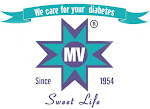Diabetes affects millions of people and is a very serious lifelong health problem. However, keeping diabetes in control is difficult as most of the tasks required for managing diabetes rests on the person with diabetes.
So it is very important to know what it takes to control blood sugars and develop skills in the methods. Here are 6 important points to remember.
So it is very important to know what it takes to control blood sugars and develop skills in the methods. Here are 6 important points to remember.
1. Diabetes and its treatment:
Diabetes cannot be completely cured but it can definitely be managed. There are basically two types of diabetes, the first being Type 1 diabetes, where in the body's immune system destroys the insulin producing cells in the pancreas. Due to low insulin level, it is treated with daily insulin injections and a healthy diet. The second type is Type2diabetes, here the pancreas does not produce enough insulin or does not use insulin efficiently. It is treated by implementing a diet modification, exercise plan or oral medication. Most people have this type and the sudden spurt in cases is said to be due to life style changes.
2. Timely medication:
Medicines and injections are very important to manage diabetes. Learn all you can about the medicines and the dosages the doctor prescribes and follow it carefully. Always have the prescription at hand whenever you make any appointment with any healthcare professional and keep a stock of medicines while travelling to avoid any medicinal complications.
3. The right FOOD:
The right food is key to managing diabetes. Stick to the diet recommended by the dietitian to maintain weight and to lower blood sugar. Never skip meals and eat three small meals along with healthy snacks to keep blood sugar level in control. Learn how to count carbs and add variety to meals.
4. Self-testing:
Test blood glucose regularly. It provides the necessary information required to balance diet, physical activity and medications. If blood sugar falls below 70 or is above 240 more than two times in a week then call your doctor.
An unbalanced blood sugar level can lead to serious complications. If your blood sugars are low (less than 70) treat it immediately with 15 grams of carbohydrates ( 3-4 glucose tablets, ½ a cup juice or 1 cup skimmed milk). After this wait for 15 minutes and retest your blood sugar level. If it is still low then repeat with 15 grams of carbohydrate. If blood sugar level is high, test blood sugar every 4 hours, drink at least 8 glasses of water to prevent dehydration and consume 45-50 grams of carbohydrates every four hours. (orange or grape juice 1 ½ cups, 3 slices of toast and regular yog hurt 1 cup).
People with Type 1 diabetes with blood glucose level greater than 240 need to test for ketones at every meal.
6. Preventive care:
People with diabetes need to worry about complications. Small cuts can become major complications. Check feet daily. Get eyes and mouth checked regularly and get complete body check up to prevent long term complications.











No comments:
Post a Comment